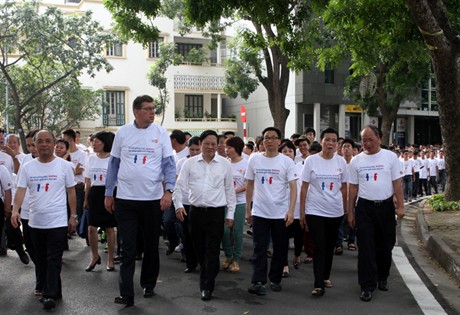Parade raises awareness of gender imbalance at birth
VGP – A parade was held on September 28 in Ha Noi to demonstrate efforts to address the imbalance at birth in Viet Nam.
|
|
|
The parade to resolve the imbalance at birth in Viet Nam, September 28, 2014 - Photo: VGP |
The imbalance at birth has become an increasing concern in Asia including Viet Nam.
The problem stems from the selection of gender at birth as Vietnamese people prefer boys and play down the role of girls.
In Viet Nam, the sex ratio at birth of 106.2 boys per 100 girls in 2000 rose to 113.8 boys per 100 girls in 2013.
Without timely measures, it is estimated that by 2050, 2.3 to 4.3 million Vietnamese men could not be able to have wives.
In addition, there are other social impacts including early marriage, rising human trafficking, abuse of women and girls.
A large number of domestic and foreign organizations attributed the problem to awareness and conception of Vietnamese people.
They proposed gender education at school, elimination of gender inequality, job generation for females and female involvement in social activities.
Earlier, a one-month campaign to raise awareness about the causes and consequences of gender-biased sex selection kicked off last week in Ha Noi.
The nationwide campaign consists of a series of workshops, policy dialogues and parades in Ha Noi, Hai Duong and Bac Ninh provinces. There will also be a social media campaign calling on the government and all stakeholders to join hands to end gender-biased sex selection.
The initiative, which marks the International Day for Girls on October 11, was launched by the General Office for Population and Family Planning (GOPFP) and the Ministry of Health in collaboration with the United Nations Population Fund (UNFPA) in Viet Nam./.
By Kim Anh


